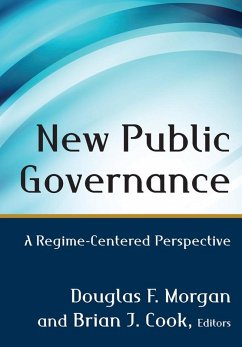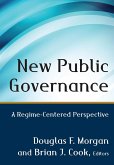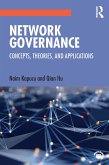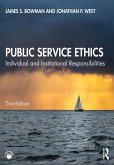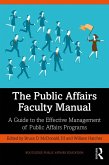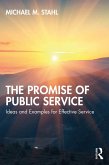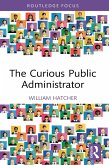48,95 €
inkl. MwSt.
Sofort per Download lieferbar

24 °P sammeln
- Format: ePub
- Merkliste
- Auf die Merkliste
- Bewerten Bewerten
- Teilen
- Produkt teilen
- Produkterinnerung
- Produkterinnerung

Bitte loggen Sie sich zunächst in Ihr Kundenkonto ein oder registrieren Sie sich bei
bücher.de, um das eBook-Abo tolino select nutzen zu können.
Hier können Sie sich einloggen
Hier können Sie sich einloggen
Sie sind bereits eingeloggt. Klicken Sie auf 2. tolino select Abo, um fortzufahren.

Bitte loggen Sie sich zunächst in Ihr Kundenkonto ein oder registrieren Sie sich bei bücher.de, um das eBook-Abo tolino select nutzen zu können.
Written by scholars who have been at the forefront of the NPG debate as well as by scholar-practitioners, this book provides lessons learned from experience on how networked, contract-based and partnership-centered approaches to government can be undertaken in ways that preserve the values at the center of the American constitutional and political system.
- Geräte: eReader
- mit Kopierschutz
- eBook Hilfe
- Größe: 5.12MB
Andere Kunden interessierten sich auch für
![New Public Governance (eBook, PDF) New Public Governance (eBook, PDF)]() Douglas MorganNew Public Governance (eBook, PDF)48,95 €
Douglas MorganNew Public Governance (eBook, PDF)48,95 €![Network Governance (eBook, ePUB) Network Governance (eBook, ePUB)]() Naim KapucuNetwork Governance (eBook, ePUB)40,95 €
Naim KapucuNetwork Governance (eBook, ePUB)40,95 €![Public Service Ethics (eBook, ePUB) Public Service Ethics (eBook, ePUB)]() James S. BowmanPublic Service Ethics (eBook, ePUB)62,95 €
James S. BowmanPublic Service Ethics (eBook, ePUB)62,95 €![Local Government Management (eBook, ePUB) Local Government Management (eBook, ePUB)]() Local Government Management (eBook, ePUB)65,95 €
Local Government Management (eBook, ePUB)65,95 €![The Public Affairs Faculty Manual (eBook, ePUB) The Public Affairs Faculty Manual (eBook, ePUB)]() The Public Affairs Faculty Manual (eBook, ePUB)41,95 €
The Public Affairs Faculty Manual (eBook, ePUB)41,95 €![The Promise of Public Service (eBook, ePUB) The Promise of Public Service (eBook, ePUB)]() Michael M. StahlThe Promise of Public Service (eBook, ePUB)38,95 €
Michael M. StahlThe Promise of Public Service (eBook, ePUB)38,95 €![The Curious Public Administrator (eBook, ePUB) The Curious Public Administrator (eBook, ePUB)]() William HatcherThe Curious Public Administrator (eBook, ePUB)24,95 €
William HatcherThe Curious Public Administrator (eBook, ePUB)24,95 €-
-
-
Written by scholars who have been at the forefront of the NPG debate as well as by scholar-practitioners, this book provides lessons learned from experience on how networked, contract-based and partnership-centered approaches to government can be undertaken in ways that preserve the values at the center of the American constitutional and political system.
Dieser Download kann aus rechtlichen Gründen nur mit Rechnungsadresse in A, B, BG, CY, CZ, D, DK, EW, E, FIN, F, GR, HR, H, IRL, I, LT, L, LR, M, NL, PL, P, R, S, SLO, SK ausgeliefert werden.
Produktdetails
- Produktdetails
- Verlag: Taylor & Francis eBooks
- Seitenzahl: 392
- Erscheinungstermin: 28. Januar 2015
- Englisch
- ISBN-13: 9781317463849
- Artikelnr.: 42188341
- Verlag: Taylor & Francis eBooks
- Seitenzahl: 392
- Erscheinungstermin: 28. Januar 2015
- Englisch
- ISBN-13: 9781317463849
- Artikelnr.: 42188341
- Herstellerkennzeichnung Die Herstellerinformationen sind derzeit nicht verfügbar.
Douglas Morgan is Professor Emeritus of Public Administration and Director of the Executive MPA Program in the Hatfield School of Government at Portland State University, USA. He has held a variety of public positions, both elected and appointed. His research interests focus on the role career public administrators play in ensuring effective and responsive systems of local democratic governance. He is coauthor of Foundations of Public Service (2013) Budgeting for Local Governments and Communities (2014). His work has appeared in the Handbook of Administrative Ethics, Oregon Politics and Government, The International Encyclopedia of Public Policy and Administration, Public Administration Review, Administration & Society, and Administrative Theory & Practice.
Brian J. Cook is Professor and Chair of the Center for Public Administration and Policy (CPAP) at Virginia Tech, USA. His teaching and scholarly interests center on public administration and constitutionalism, public administration and American political development, and the politics of public policy design and implementation, especially in the area of environmental policy. His most recent book is Democracy and Administration: Woodrow Wilson's Ideas and the Challenges of Public Management (2007). He has served as a policy analyst, advisor, research consultant to several federal, state, and local government agencies. He is currently completing a revised edition of his 1996 book Bureaucracy and Self-Government.
Brian J. Cook is Professor and Chair of the Center for Public Administration and Policy (CPAP) at Virginia Tech, USA. His teaching and scholarly interests center on public administration and constitutionalism, public administration and American political development, and the politics of public policy design and implementation, especially in the area of environmental policy. His most recent book is Democracy and Administration: Woodrow Wilson's Ideas and the Challenges of Public Management (2007). He has served as a policy analyst, advisor, research consultant to several federal, state, and local government agencies. He is currently completing a revised edition of his 1996 book Bureaucracy and Self-Government.
Preface
Part I. Developing a Theory of Governance for NPG: What Should Be at Its
Center?
1. The Foundations of New Public Governance, Douglas F. Morgan and Craig W.
Shinn
2. Why a Constitutional Approach Matters for Advancing New Public
Governance, Stephanie P. Newbold
3. Institutional History and New Public Governance, Richard T. Green
4. A Value-Based Global Framework for New Public Governance, Douglas F.
Morgan, Gary L. Larsen, Guoxian Bao, and Xuejun Wang
5. History as a Source of Values for New Public Governance, Donald P.
Moynihan
6. Two Kinds of Rationality and Their Implications for New Public
Governance, Michael W. Spicer
Part II. NPG and Local Governing Institutions: Transforming Deliberative
Democracy into Action
7. The American Constitutional Legacy and the Deliberative Democracy
Environment of New Public Governance, Vera Vogelsang-Coombs
8. Civic Capacity Assessment Framework, Margaret Banyan
9. Building Capacity in Culturally Diverse Communities Through Community
Engagement in Hard Times, Claudia Maria Vargas
10. Forging Vertical and Horizontal Integration in Public Administration
Leadership and Management, Gary L. Larsen
11. Civic Infrastructure and Capacity Building: Lessons from the Field,
Don Bohn
12. Local Government as Polity Leadership: Implications for New Public
Governance, Kent S. Robinson and Douglas F. Morgan
13. Interest-Based Deliberative Democracy in Natural Resource Management,
Debra Whitall, Craig Thomas, Steve Brink, and Gina Bartlett
14. Multilevel Environmental Governance of Conservation Programs, Shpresa
Halimi and Craig W. Shinn
Part III. Public Service Education and Leadership in an Age of NPG
15. Regime Leadership for Public Servants, Brian J. Cook
16. Competing Needs, Expectations, and Realities in Local Government
Education, Phillip J. Cooper
17. Agency in Networks: Implications for Theory and Practice in the New
Public Governance, Eric T. (Rick) Mogren
18. EMERGE: Public Leadership for Sustainable Development, Kristen Magis,
Marcus Ingle, and Ngo Huy Duc
19. Preparing the Next Generation for Local Government Leadership, Scott
Lazenby
20. Educating Leaders for New Public Governance: Public Administration as a
Liberal Art, Douglas F. Morgan
21. Rethinking U.S. Public Administration Doctoral Education in the Age of
New Public Governance, Stephanie P. Newbold and David H. Rosenbloom
22. Educating for New Public Governance: Civic Engagement and the Liberal
Arts, Kevin Kecskes, Masami Nishishiba, and Douglas F. Morgan
23. Epilogue: Research Questions to Improve the Theory and Practice of NPG,
Douglas F. Morgan, Craig W. Shinn, and Brian J. Cook
References
About the Authors
Index
Part I. Developing a Theory of Governance for NPG: What Should Be at Its
Center?
1. The Foundations of New Public Governance, Douglas F. Morgan and Craig W.
Shinn
2. Why a Constitutional Approach Matters for Advancing New Public
Governance, Stephanie P. Newbold
3. Institutional History and New Public Governance, Richard T. Green
4. A Value-Based Global Framework for New Public Governance, Douglas F.
Morgan, Gary L. Larsen, Guoxian Bao, and Xuejun Wang
5. History as a Source of Values for New Public Governance, Donald P.
Moynihan
6. Two Kinds of Rationality and Their Implications for New Public
Governance, Michael W. Spicer
Part II. NPG and Local Governing Institutions: Transforming Deliberative
Democracy into Action
7. The American Constitutional Legacy and the Deliberative Democracy
Environment of New Public Governance, Vera Vogelsang-Coombs
8. Civic Capacity Assessment Framework, Margaret Banyan
9. Building Capacity in Culturally Diverse Communities Through Community
Engagement in Hard Times, Claudia Maria Vargas
10. Forging Vertical and Horizontal Integration in Public Administration
Leadership and Management, Gary L. Larsen
11. Civic Infrastructure and Capacity Building: Lessons from the Field,
Don Bohn
12. Local Government as Polity Leadership: Implications for New Public
Governance, Kent S. Robinson and Douglas F. Morgan
13. Interest-Based Deliberative Democracy in Natural Resource Management,
Debra Whitall, Craig Thomas, Steve Brink, and Gina Bartlett
14. Multilevel Environmental Governance of Conservation Programs, Shpresa
Halimi and Craig W. Shinn
Part III. Public Service Education and Leadership in an Age of NPG
15. Regime Leadership for Public Servants, Brian J. Cook
16. Competing Needs, Expectations, and Realities in Local Government
Education, Phillip J. Cooper
17. Agency in Networks: Implications for Theory and Practice in the New
Public Governance, Eric T. (Rick) Mogren
18. EMERGE: Public Leadership for Sustainable Development, Kristen Magis,
Marcus Ingle, and Ngo Huy Duc
19. Preparing the Next Generation for Local Government Leadership, Scott
Lazenby
20. Educating Leaders for New Public Governance: Public Administration as a
Liberal Art, Douglas F. Morgan
21. Rethinking U.S. Public Administration Doctoral Education in the Age of
New Public Governance, Stephanie P. Newbold and David H. Rosenbloom
22. Educating for New Public Governance: Civic Engagement and the Liberal
Arts, Kevin Kecskes, Masami Nishishiba, and Douglas F. Morgan
23. Epilogue: Research Questions to Improve the Theory and Practice of NPG,
Douglas F. Morgan, Craig W. Shinn, and Brian J. Cook
References
About the Authors
Index
Preface
Part I. Developing a Theory of Governance for NPG: What Should Be at Its
Center?
1. The Foundations of New Public Governance, Douglas F. Morgan and Craig W.
Shinn
2. Why a Constitutional Approach Matters for Advancing New Public
Governance, Stephanie P. Newbold
3. Institutional History and New Public Governance, Richard T. Green
4. A Value-Based Global Framework for New Public Governance, Douglas F.
Morgan, Gary L. Larsen, Guoxian Bao, and Xuejun Wang
5. History as a Source of Values for New Public Governance, Donald P.
Moynihan
6. Two Kinds of Rationality and Their Implications for New Public
Governance, Michael W. Spicer
Part II. NPG and Local Governing Institutions: Transforming Deliberative
Democracy into Action
7. The American Constitutional Legacy and the Deliberative Democracy
Environment of New Public Governance, Vera Vogelsang-Coombs
8. Civic Capacity Assessment Framework, Margaret Banyan
9. Building Capacity in Culturally Diverse Communities Through Community
Engagement in Hard Times, Claudia Maria Vargas
10. Forging Vertical and Horizontal Integration in Public Administration
Leadership and Management, Gary L. Larsen
11. Civic Infrastructure and Capacity Building: Lessons from the Field,
Don Bohn
12. Local Government as Polity Leadership: Implications for New Public
Governance, Kent S. Robinson and Douglas F. Morgan
13. Interest-Based Deliberative Democracy in Natural Resource Management,
Debra Whitall, Craig Thomas, Steve Brink, and Gina Bartlett
14. Multilevel Environmental Governance of Conservation Programs, Shpresa
Halimi and Craig W. Shinn
Part III. Public Service Education and Leadership in an Age of NPG
15. Regime Leadership for Public Servants, Brian J. Cook
16. Competing Needs, Expectations, and Realities in Local Government
Education, Phillip J. Cooper
17. Agency in Networks: Implications for Theory and Practice in the New
Public Governance, Eric T. (Rick) Mogren
18. EMERGE: Public Leadership for Sustainable Development, Kristen Magis,
Marcus Ingle, and Ngo Huy Duc
19. Preparing the Next Generation for Local Government Leadership, Scott
Lazenby
20. Educating Leaders for New Public Governance: Public Administration as a
Liberal Art, Douglas F. Morgan
21. Rethinking U.S. Public Administration Doctoral Education in the Age of
New Public Governance, Stephanie P. Newbold and David H. Rosenbloom
22. Educating for New Public Governance: Civic Engagement and the Liberal
Arts, Kevin Kecskes, Masami Nishishiba, and Douglas F. Morgan
23. Epilogue: Research Questions to Improve the Theory and Practice of NPG,
Douglas F. Morgan, Craig W. Shinn, and Brian J. Cook
References
About the Authors
Index
Part I. Developing a Theory of Governance for NPG: What Should Be at Its
Center?
1. The Foundations of New Public Governance, Douglas F. Morgan and Craig W.
Shinn
2. Why a Constitutional Approach Matters for Advancing New Public
Governance, Stephanie P. Newbold
3. Institutional History and New Public Governance, Richard T. Green
4. A Value-Based Global Framework for New Public Governance, Douglas F.
Morgan, Gary L. Larsen, Guoxian Bao, and Xuejun Wang
5. History as a Source of Values for New Public Governance, Donald P.
Moynihan
6. Two Kinds of Rationality and Their Implications for New Public
Governance, Michael W. Spicer
Part II. NPG and Local Governing Institutions: Transforming Deliberative
Democracy into Action
7. The American Constitutional Legacy and the Deliberative Democracy
Environment of New Public Governance, Vera Vogelsang-Coombs
8. Civic Capacity Assessment Framework, Margaret Banyan
9. Building Capacity in Culturally Diverse Communities Through Community
Engagement in Hard Times, Claudia Maria Vargas
10. Forging Vertical and Horizontal Integration in Public Administration
Leadership and Management, Gary L. Larsen
11. Civic Infrastructure and Capacity Building: Lessons from the Field,
Don Bohn
12. Local Government as Polity Leadership: Implications for New Public
Governance, Kent S. Robinson and Douglas F. Morgan
13. Interest-Based Deliberative Democracy in Natural Resource Management,
Debra Whitall, Craig Thomas, Steve Brink, and Gina Bartlett
14. Multilevel Environmental Governance of Conservation Programs, Shpresa
Halimi and Craig W. Shinn
Part III. Public Service Education and Leadership in an Age of NPG
15. Regime Leadership for Public Servants, Brian J. Cook
16. Competing Needs, Expectations, and Realities in Local Government
Education, Phillip J. Cooper
17. Agency in Networks: Implications for Theory and Practice in the New
Public Governance, Eric T. (Rick) Mogren
18. EMERGE: Public Leadership for Sustainable Development, Kristen Magis,
Marcus Ingle, and Ngo Huy Duc
19. Preparing the Next Generation for Local Government Leadership, Scott
Lazenby
20. Educating Leaders for New Public Governance: Public Administration as a
Liberal Art, Douglas F. Morgan
21. Rethinking U.S. Public Administration Doctoral Education in the Age of
New Public Governance, Stephanie P. Newbold and David H. Rosenbloom
22. Educating for New Public Governance: Civic Engagement and the Liberal
Arts, Kevin Kecskes, Masami Nishishiba, and Douglas F. Morgan
23. Epilogue: Research Questions to Improve the Theory and Practice of NPG,
Douglas F. Morgan, Craig W. Shinn, and Brian J. Cook
References
About the Authors
Index
